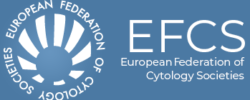| This text came from a clinical-pathological consensus conference among endocrinologists and pathologists of the respective Italian Scientific Societies: SIAPEC-IAP and SIE |
See also the |
Thyroid nodule
“Cytologic Consensus” Review
Florence September 12, 2007
The term FNC is an acronym for “fine needle cytology”. This technique provides a cytologic sample using a 22G needle (or thinner) with or without aspiration.
In the cytologic report the needle gauge should be reported.
In case of solid and highly vascularized nodules the sampling without aspiration is suggested.
Ultrasonography can be useful for multinodular glands and for cystic lesions with a solid component protruding into their cavity. The presence of the cytopathologist on-site is recommended for the evaluation of the sampling adequacy. The aspirated material should be smeared on a glass slide. The liquid based cytology techniques (LBS) have not shown a real advantage in comparison with the traditional method; therefore, they should be adopted only in reference centers by experienced cytopathologists. The cell block is an additional technique and it is useful when further investigations are necessary.
The main goal of FNC is to distinguish patients who may benefit from a medical treatment from those who should undergo surgery
In non-functioning thyroid nodules the FNC diagnostic accuracy is 95%. Ideal parameters of quality recommend less than 2% false negative and less than 3% false positive results. The cytologic report should be descriptive and, whenever possible, a diagnosis should be made. A numeric code identifying a category of lesions homogeneous for malignancy risk and therapeutic options can be added to the cytologic report.
Clinical request forms should contain essential clinical information, including the sampling site and the modality of the corresponding FNA.
